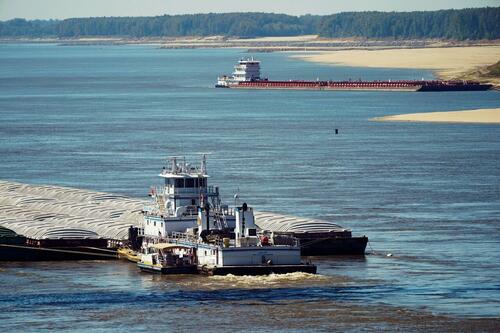“It’s Disastrous”: Mississippi Barge Captain Warns About Supply Chain Crisis As Water Levels Drop
 By Tyler Durden
By Tyler Durden
Drought closed a portion of the Mississippi River earlier this week, as the major waterway has been an absolute nightmare for tugboat captains to navigate.
A stretch of the Mississippi River just northeast of Memphis, near Hickman, Kentucky, was closed on Monday because water levels reached record low levels. This caused a logjam of vessels and barges. And it’s the third time a portion of the river has been shuttered in weeks.
We’ve reported dangerously low water levels have left farmers with a barge shortage as freight rates hyperinflate. Some farmers have piled up beans and other crops as logistical pipelines to transport farm goods from the Heartland by barge to export terminals in the US Gulf Coast are paralyzed due to extraordinary conditions on the Mississippi.
Ag blog Delta Farm Press‘ senior staff writer Ginger Rowsey spoke with barge captain Eric Badeaux who said it usually takes him 1-2 days to move barges from Morris, Illinois, down the Illinois River to the Mississippi River and on to New Orleans. He’s got over four decades of navigating cargo on the waterways and said because of drought and obstacles, it now takes 8-10 days for the same distance.
“We had been on the boat two weeks and had not even made it to Memphis yet,” Badeaux said. At one point, Badeaux and his crew only traveled 60 miles in four days. They typically average 200 miles per day when heading south.
“In one day, we burned 2,367 gallons of diesel fuel, just sitting here fighting the current,” Badeaux said. “That comes out to about $10,000 in fuel for one day, and we barely moved. Multiply the fuel costs for all of the boats just sitting here, plus all the other costs involved in boat maintenance and you can see why transportation costs are through the roof. It’s disastrous.”
On a recent trip, Rowsey said that Badeaux pulled 20 barges of corn, soybeans, and coiled steel down the river, along with ten empty barges. He said the rapidly dropping water levels make the waterway risky to haul more barges. An average tow usually consists of 30-40 full barges.
 Patriot Pantry 3-Month Emergency Food Supply – 876 Servings – (2,000+ caloriesday) by Ready Hour, 121 Pound (Pack of 1)
Patriot Pantry 3-Month Emergency Food Supply – 876 Servings – (2,000+ caloriesday) by Ready Hour, 121 Pound (Pack of 1)
Badeaux said the river closures have made everything “congested,” and “traffic is moving slowly.” He said today’s river conditions are as bad as in 1988 when severe droughts led to supply chain disruptions.
He said one of the worst places to navigate is around Memphis:
“Memphis to Vicksburg is absolutely the worst part of the river to navigate. It’s flat, shallow, there are hard turns, and the river is swift.”
He spoke about the extreme difficulty experienced captains are having in navigating the waterway:
“The bottom of the river is like a roller coaster,” he said, describing the vastly uneven levels of the riverbed, “and it’s never the same. When the river stays high and then drops out, it deposits sediment in new places and creates sandbars where there wasn’t a sandbar before.”
And warned:
“There are a lot of new hands on the water now who have very little to no experience, and that lack of experience can lead to bad decisions.”
Badeaux’s story of the nation’s most crucial waterway in crisis should be disturbing. About 60% of the country’s grain for export traverses the waterway to terminals in the Gulf. If the flow of farm goods and commodities from the Heartland is disrupted, this could have significant implications for customers who rely heavily on US exports.
Source: ZeroHedge



